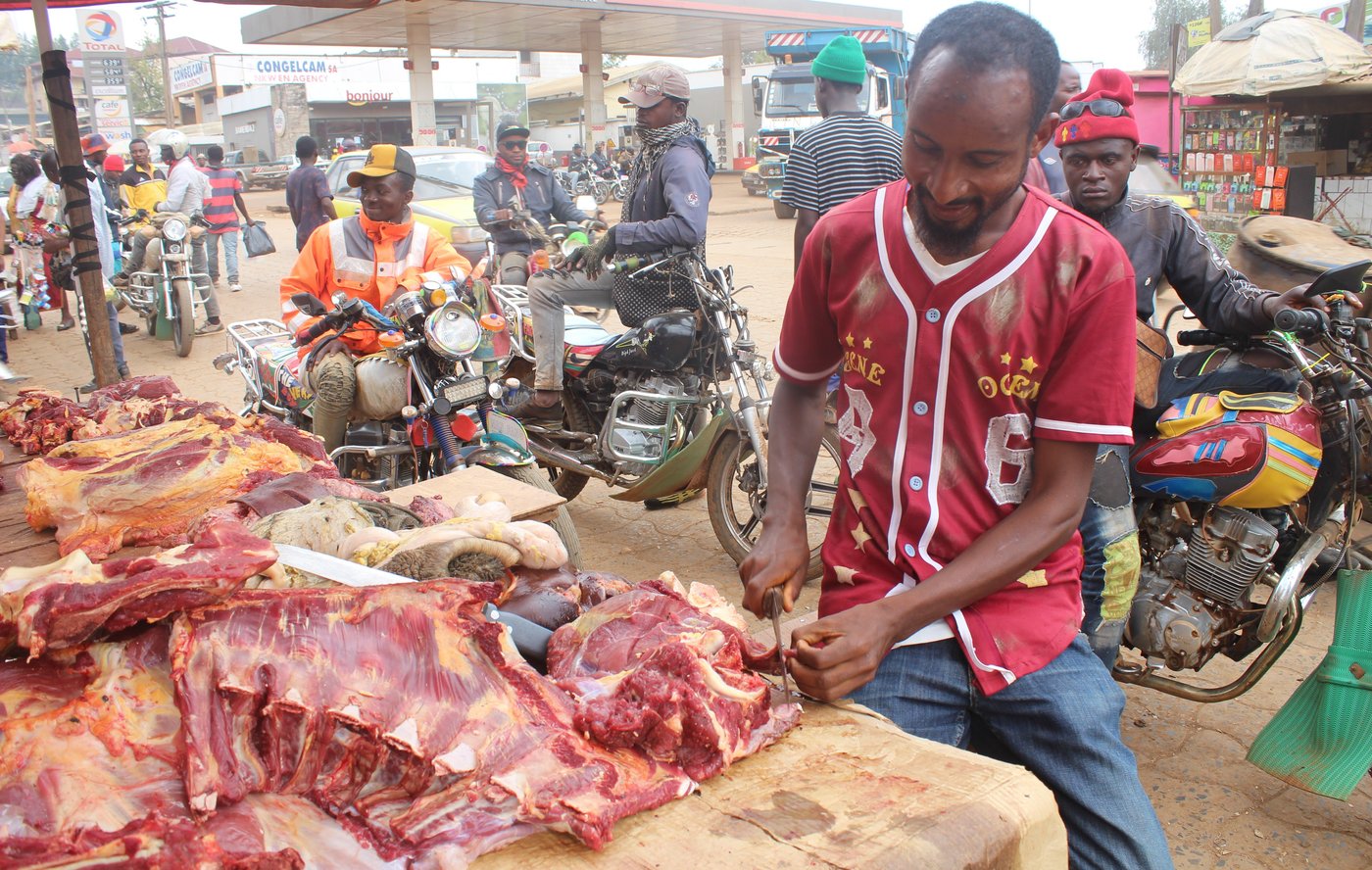Booba is 37 year old internally displaced man from Belo division in the Northwest region of Cameroon. Since 2018, he has lived with his family of 11 including his 3 children and his wife in Mile 5 Nkwen in Bamenda, having fled due to the crisis. With no financial means to take care of his household, he started selling meat to support himself and his family, but it was very challenging: Booba was the only breadwinner for his wife and children, as well as his sisters and their children. He felt hopeless: “I was selling for a certain guy, and he didn't always pay me what he should. Sometimes it was difficult to get even white rice to eat, and with 11 people in our small house, it was unbearable," he recalls. Booba was very interested in selling meat and hoped one day to have his own space to run his business and bring in money to take care of his family: "selling in someone's space and for someone made me dependent, I couldn't do anything if the owner didn't give me anything, and sometimes that happened” he added. As part of the Livelihood and Food Security programme, NRC teams identified him to receive monthly cash for food assistance. "With the 37,500 I received during those 3 months, I was so relieved because I could at least feed my family, and thanks to the advice I received, I decided to save some money for emergencies,” he says. Following this, he received cash assistance to support the creation of an Income-Generating Activity, which of course was meat sales.
3 months after creating his meat sales business, Booba is proud of what he achieved in a short period, from scratch:“Now I have my own space where I sell every day and earn my own money. Before I had about 5000 CFA F per week, now I earn almost double that. This allows me not only to feed my family, but also to save money, which was impossible before”, he proudly says.

A neglected crisis
Inflationary pressures on food products have intensified in Cameroon since the start of COVID-19 and has been accentuated by the Ukraine war. According to the National Institute of Statistics, Cameroon had a general inflation rate of 6.6%t in August 2022, which is above the Central African Economic and Monetary Community (CEMAC) zone inflation threshold of 3%. NRC’s Livelihood and Food Security programme in Cameroon aims to reach and provide sufficient, appropriate and holistic food and livelihood assistance to people affected by displacement, who are the most vulnerable because they are forced to abandon their economic activities and sources of income as a result of conflict. The objective is to ensure a greater likelihood of success in securing people’s ability to access sufficient, safe and nutritious food, achieve self-sufficiency and participate in economic activities. This has been achieved thanks to the significant support from the Swedish International Development cooperation Agency (SIDA) through which, 516 households have been reached in the North-West region, enabling 3,096 persons, including 1,579 women and 1,517 men, to improve their food security and revive their livelihoods. This allowed Booba to get back on his feet: "I don't have problems anymore; I don't think too much like before. I know that if a member of my family has a need, I can solve it without having to ask around. I am financially independent and that makes me very proud”.
Reviving livelihoods in the Northwest region Cameroon
Since October 2016, Cameroon’s deep-rooted grievances along the anglophone-francophone divide have morphed into political demands, leading to protests and strikes. This in turn further evolved into an armed conflict resulting in the destruction of schools and markets and retaliation against villages (e.g. burning of houses, harassment, and violence). According to the United Nations Office for the Coordination for Humanitarian Affairs (OCHA), as of 7 December, 2022, 2,000,000 individuals were displaced by the crisis, including 628,000 internally displaced people in Cameroon. Insecurity continues to disrupt the farming season as it leads to the displacement of many households who flee to more secure locations, especially to peri-urban and urban areas abandoning production farms, assets, and livelihoods. In October 2022, according to the analysis of “Cadre Harmonisé”, most of the divisions of the North-West and South-West regions, remain in the food insecurity crisis, and 44.4% of the population of the North-West is considered food-insecure. Moreover, despite the fact that Cameroon is the World’s 3rd most neglected displacement crises in 2021, as of December 2022, only 41% of the Humanitarian Response Plan (HRP) had been funded. The humanitarian community should continue to reinforce its response quality, timeliness, and efficiency in an operational context that remains complex and challenging. Resources are desperately needed to assist the most vulnerable populations and provide a lifeline to internally displaced people both in the North-West and South-West regions. Donor and partner commitment is required more than ever.


